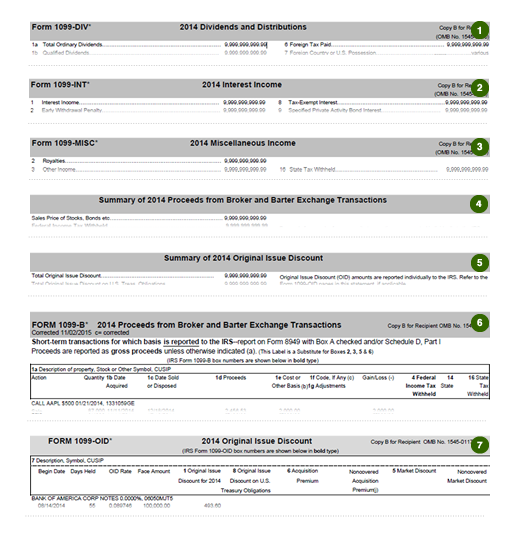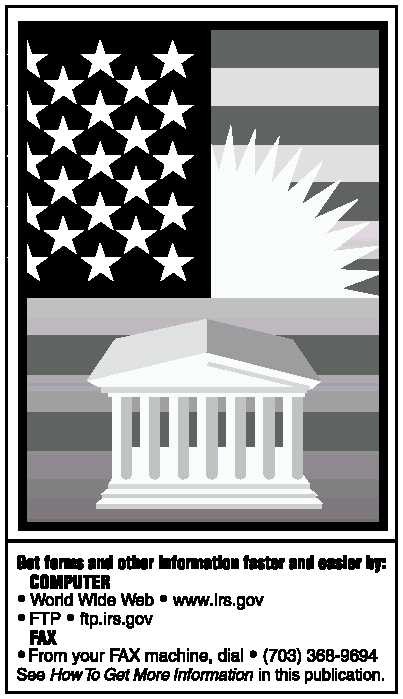Exempt Interest Distributions
Post on: 2 Май, 2015 No Comment

By Kaye A. Thomas
Current as of February 15, 2013
Tax rules that apply to exempt interest distributions you may receive from a mutual fund.
Some mutual funds are established to provide a way to invest in municipal bonds and other securities that produce tax-exempt interest. Distributions from these mutual funds are usually composed mainly of tax-exempt interest. Under the special tax rules for mutual funds, you should treat the tax-exempt interest portion of your dividend the same as if you received the tax-exempt interest directly.
Where to get the number: At one time mutual funds reported exempt interest on Form 1099-INT, but it will now appear on Form 1099-DIV.
Although these dividends are generally tax-free, you cant simply ignore them:
- Your dividend from this type of mutual fund isnt necessarily entirely tax-exempt. You may have to report part of your dividend as ordinary income or capital gain.
- Exempt interest dividends must be reported on your income tax return.
- These dividends may affect the amount of tax you pay on your social security income.
- Exempt interest dividends may affect your deduction for investment interest expense and other investment expenses.
- Exempt interest dividends may be partly or entirely subject to the alternative minimum tax (AMT).
- Some or all of your exempt interest dividend may be subject to state income tax.
- If the dividends are reinvested, they add to your basis in the shares you hold, reducing your gain (or increasing your loss) when you sell shares of the mutual fund.
Details on these points appear below.
Suitability
Municipal bond funds are suitable primarily for taxpayers in the higher tax brackets. The reason is that for an equivalent amount of risk, these funds provide a lower rate of return. If youre in a high tax bracket, the tax savings can more than make up for the lower rate of return. If youre in a lower tax bracket you may still see some tax savings, but they wont be large enough to compensate for the lower interest rate.
Its even more important to avoid municipal bond funds when youre investing your IRA. The IRA gets no benefit at all from receiving exempt interest because all interest is exempt inside an IRA, and you dont get any benefit when the money is paid out of the IRA, either. The rules for the type of IRA holding the investment (traditional or Roth) determine whether the distribution is taxable or not, and it doesnt make any difference at all if the earnings originally came from tax-exempt interest.
Comment: Theres no rule against investing in a municipal bond fund in these situations — other than the rule of common sense.
Other dividends from municipal bond funds
Not all distributions from municipal bond funds are exempt interest dividends. A portion of the distribution may be ordinary dividend or capital gain. These amounts will be reported on Form 1099-DIV.
Dont make this mistake: Some mutual funds make nondividend distributions, which are not taxable. Dont confuse these nontaxable distributions with exempt interest dividends. Their tax treatment is entirely different. See Nondividend Distributions .

Reporting exempt interest dividends
Mutual funds are now required to report exempt interest dividends on Form 1099-DIV. Although it appears on a dividend form, youll report it as exempt interest. Combine it with any other exempt interest you receive for the year and report the total as indicated on your tax return.
Note: Reporting this income on your tax return does not cause it to be taxable. It wont appear as part of your taxable income, but youre required to report it anyway. As explained below, it can affect the amount of tax you pay even though its not taxable.
Note: If you receive an exempt interest dividend and subsequently incur a short-term capital loss on a sale of mutual fund shares you held six months or less, see Shares Held Six Months or Less for a special rule.
Effect on Social Security income
Social Security income is partially taxable if your income rises above certain levels. For the special purpose of determining how much tax you pay on your Social Security income, tax-exempt interest counts as income. As a result, its possible that having a greater amount of exempt interest income can increase the amount of tax you pay on your Social Security income.
This issue mainly affects middle-income taxpayers. If your income is very high, additional income wont cause you to pay tax on a greater portion of your Social Security income because youre already at the maximum. And if your income is very low, municipal bond funds arent suitable for you, as explained earlier.
Effect on investment expense deductions
You arent allowed to deduct any expense that relates to tax-exempt income. This rule applies to investment interest expense and also other types of investment expenses. If part of your investment income is from tax-exempt interest, you have to limit your deductions to the portion of investment expenses that do not relate to tax-exempt interest.
One way to determine the amount of your deduction is to base it on the portion of your investment income thats taxable. For example, if you have $400 of investment interest expense or other investment expenses, and 75% of your investment income is taxable, then only $300 of the deduction would be allowed. (Other limitations apply to these types of deductions.)
But if you have expenses that relate to specific investments, you dont have to use this rule for those expenses. For example, if you subscribe to an investment newsletter that helps you select your taxable investments and doesnt have anything to do with your exempt interest investments, you arent required to allocate part of that expense to your exempt interest income.
Alternative minimum tax (AMT)
Tax-exempt interest that falls into a category the IRS calls specified private activity bond interest is potentially subject to the alternative minimum tax, or AMT. The same Form 1099-DIV that shows the amount of exempt interest you received from your mutual fund should indicate how much interest of this type you received.
You may not actually pay any AMT if you received only a small amount of interest in this category. If you receive large amounts of this interest, or if you have other items on your tax return that are affected by AMT, this portion of your exempt interest distribution may cause you to pay additional tax as a result of the AMT.
Note: If youre concerned about AMT, you may be able to identify a mutual fund that invests exclusively or mainly in the type of bonds that dont produce AMT interest.
State income tax
Interest thats exempt from federal income tax isnt necessarily exempt from state income tax. Some states dont provide any exemption for municipal bond interest, and some provide an exemption only for interest from bonds in that particular state. For more information review the instructions for your states income tax return. The mutual funds annual statement should tell you how much of the exempt interest comes from each state.
Tip: If you live in a state that has high income tax rates, you may be able to find a mutual fund that specializes in municipal bonds from that state, so you can receive interest thats exempt from both federal and state income tax.
Basis from reinvestment
If your exempt interest distributions are reinvested, youre treated the same as if you received the distribution in cash (tax-free) and then used that cash to make a purchase of additional mutual fund shares. You have basis for those shares, and thats good: it reduces the amount of gain (or increases the amount of loss) you report when you sell the shares. When you sell shares, dont forget that you paid for the shares that came from dividend reinvestment.














